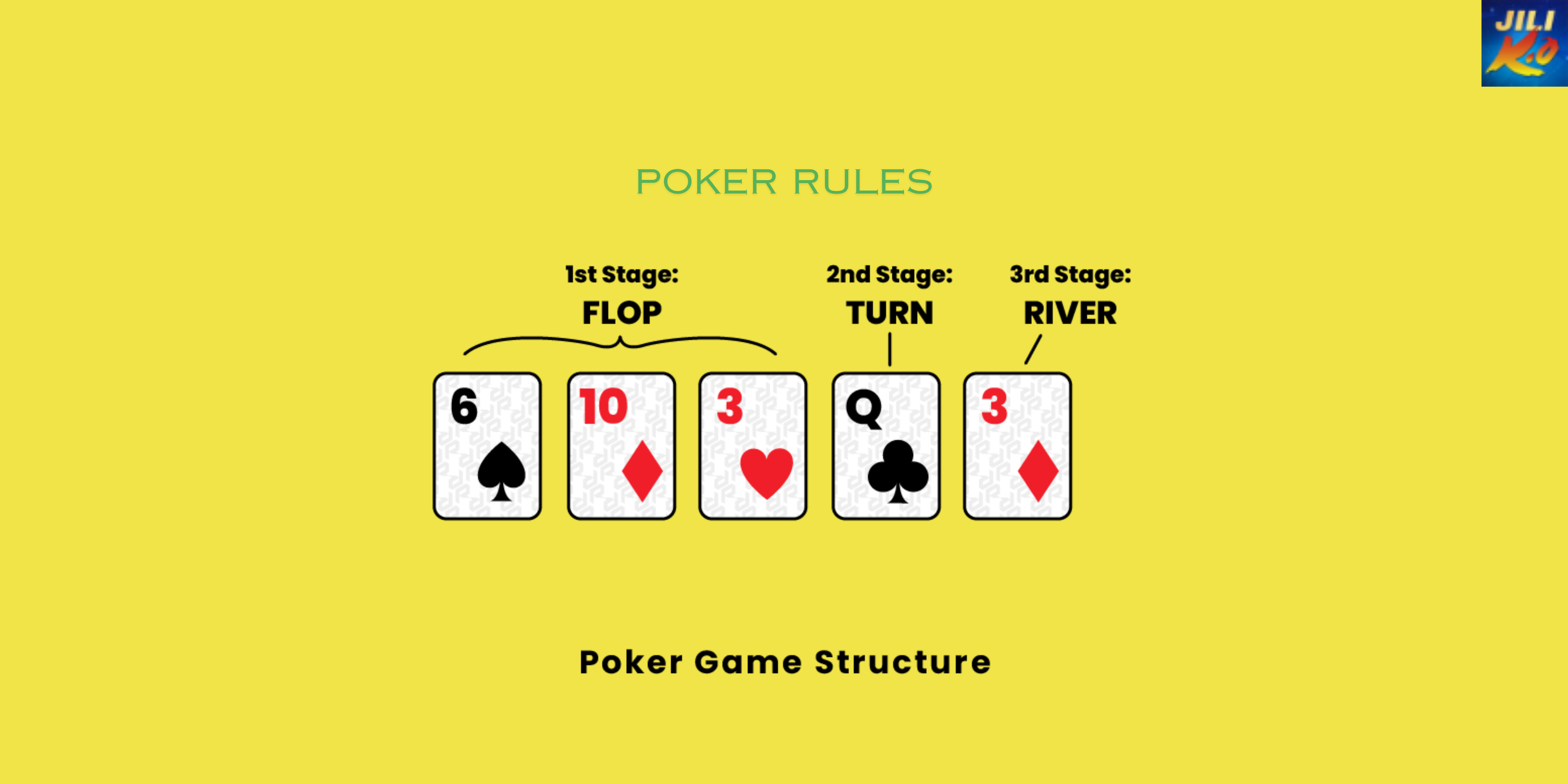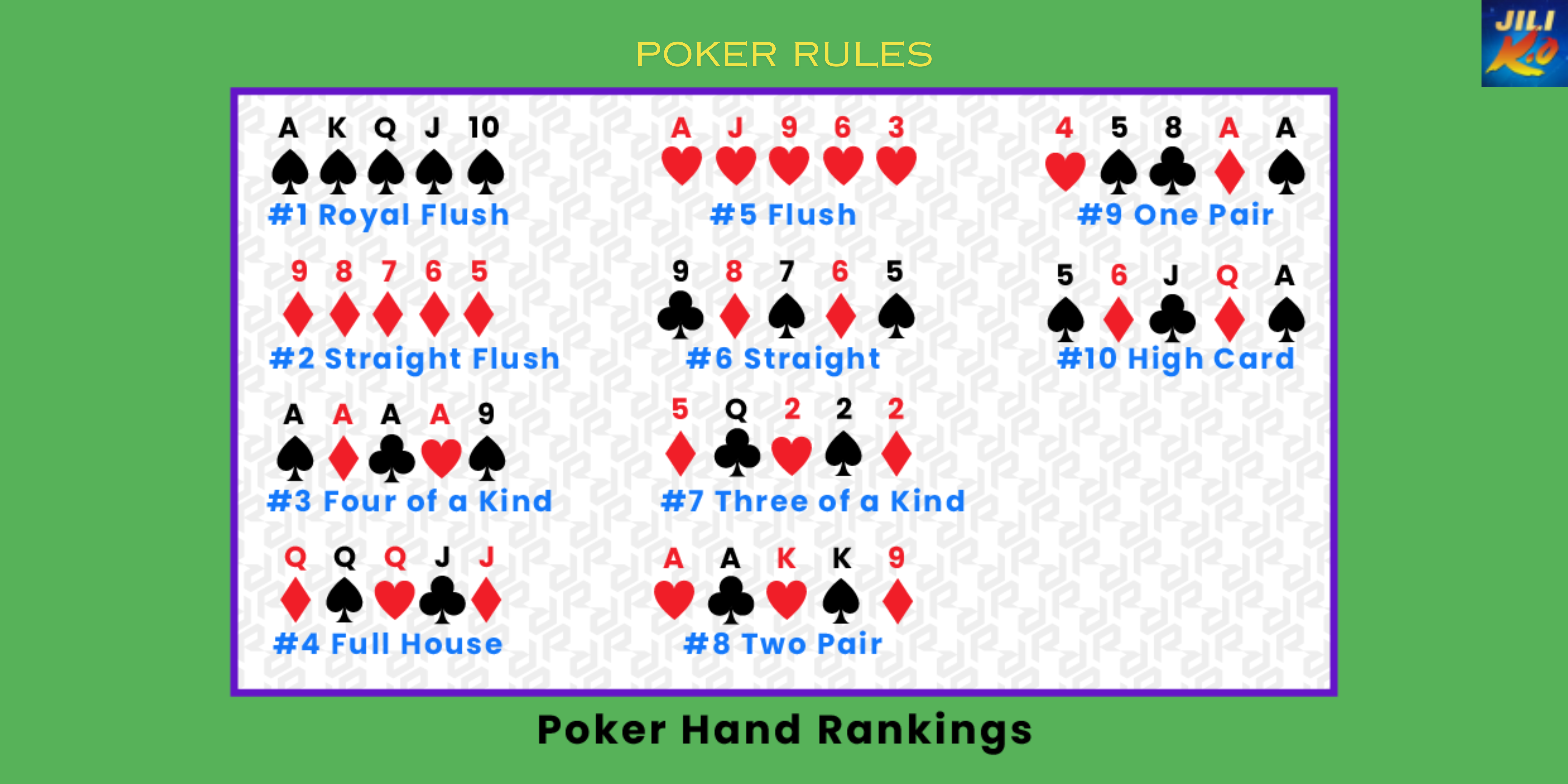
Poker Rules, the game that has fascinated players for generations, combines skill, strategy, and a touch of psychology. Whether you’re playing with friends or aspiring to compete in the World Series of Poker Rules, understanding poker rules is your first big step toward success. In this comprehensive guide, we’re here to walk you through the world of poker rules, from the basics of the deck to the intricate strategies of the game. So, let’s dive right in and explore the exciting realm of poker.
Table of Contents
The Deck and Card Rankings
Before we get into the nitty-gritty of poker, let’s start with the basics. Poker Rulesis played with a standard deck of 52 cards. These cards come in four suits: hearts, diamonds, clubs, and spades. Each suit has thirteen ranks, ranging from the lowest, which is the two, to the highest, the ace.
Now, here’s an important thing to remember: in Poker Rules, all suits are equal. That means the Ace of spades doesn’t have any magical powers over the ace of hearts. The only time suits might matter is in very rare situations when resolving ties.
Poker Hand Rankings

Now that you know your way around a deck of cards, let’s talk about what really matters in Poker Rules: the hands. Poker hands are combinations of five cards that determine who wins a round. Here’s a quick rundown of the standard hand rankings from the best to the least powerful:
- Royal Flush: This is the best hand you can possibly get – A, K, Q, J, 10, all in the same suit. It’s practically unbeatable.
- Straight Flush: Five consecutive cards of the same suit, like 9, 8, 7, 6, 5 of hearts.
- Four of a Kind: Four cards of the same rank, like four 8s.
- Full House: Three cards of one rank and two cards of another rank, such as three 6s and two 2s.
- Flush: Five cards of the same suit, but not in sequence.
- Straight: Five consecutive cards of different suits, for example, 10 of hearts, 9 of diamonds, 8 of spades, 7 of clubs, and 6 of hearts.
- Three of a Kind: Three cards of the same rank, like three Queens.
- Two Pair: Two cards of one rank and two cards of another rank, like two 10s and two 4s.
- One Pair: Two cards of the same rank, such as two Kings.
- High Card: When none of the above hands are in play, the player with the highest card wins.
Keep in mind, when two hands share the same rank (like two full houses), the one with the higher-ranking cards takes the pot. If they’re still tied, the winnings get split.
Betting Rounds
Now that you know the hands that matter, let’s talk action. Poker Rules is all about making bets, and understanding how the betting works is crucial.
Most Poker Rules games have several betting rounds, including the popular ones like Texas Hold’em and Omaha. Here’s a simple breakdown of how the action unfolds:
- Pre-Flop: The game kicks off with each player receiving two private cards, also known as hole cards. The player on the left of the dealer is the first to place a bet.
- The Flop: Three community cards are dealt face-up on the table. Another round of betting follows.
- The Turn: A fourth community card is revealed, and the betting action continues.
- The River: The fifth and final community card is shown, triggering the last round of betting.
- Showdown: If there are still two or more players in the game after the final round of betting, they reveal their hands. The player with the best hand takes the pot.
Types of Poker Games
Poker Rules isn’t a one-size-fits-all game. There are various flavors to choose from, but the most popular ones include Texas Hold’em, Omaha, and Seven Card Stud. Let’s give you a quick overview of each:
- Texas Hold’em: In this game, you get two private cards, and five community cards are laid face-up. Your job is to create the best hand using any combination of these seven cards.
- Omaha: Think of it as a close cousin to Texas Hold’em. In Omaha, you receive four private cards but must use exactly two of them along with three of the five community cards to form your hand.
- Seven Card Stud: Here, you get a total of seven cards: three face-down and four face-up. Your task is to craft the best hand using any five out of these seven cards.
These are just a few examples, and there are plenty more Poker Rules variations out there, each with its own set of rules and strategies.
Starting Hands and Position
Now, when you sit down at a Poker Rules table, your starting hand is your opening act. It sets the stage for the entire game. Here are some things to remember:
High-Value Hands: Hands with pairs of high-value cards, like a pair of Aces, are strong starting hands.
Suited Connectors: Cards of the same suit that are close in rank, such as 9 and 10 of hearts, can lead to flushes or straights.
Position Matters: Where you sit at the table matters. Players who act later have more information, which often leads to better decisions.
The Flop, Turn, and River
The community cards are where the excitement happens in Poker Rules. They can make or break a hand, and they’re when the real mind games come into play. Pay close attention to how your opponents bet and react to these community cards – it’s a key part of the strategy.
Pot Odds and Expected Value
In Poker Rules, it’s not just about the strength of your hand; it’s also about making the right bets. To do that, you need to understand pot odds and expected value (EV). Let’s break it down:
- Pot Odds: Compare the current pot size to the cost of your next bet. If the odds of completing your hand are better than the pot odds, it’s a good call.
- Expected Value (EV): This involves calculating the potential value of a bet by considering both your odds of winning and the size of the pot. A positive EV bet is generally profitable in the long run.
Poker Etiquette
A smooth and enjoyable poker game relies on proper etiquette. Here are some basic rules to follow:
- Keep Your Cards Close: Don’t reveal your cards or discuss them with others while a hand is in progress.
- Play Your Turn: Wait for your turn to make decisions, and try to do so promptly.
- Mind Your Tongue: Excessive talking or trash talk can disrupt the game and annoy your fellow players.
- Respect Everyone: Show respect and courtesy to your fellow players and the dealer.
Poker Tournaments and Cash Games
Poker can be played in two primary formats: tournaments and cash games.
- Tournaments: Players buy into a tournament with a fixed amount and receive a stack of chips. The goal is to eliminate opponents and accumulate chips. Tournaments have set blind levels, and players are gradually eliminated until one player holds all the chips.
- Cash Games: In cash games, players buy chips and can leave the game at any time, exchanging their chips for cash. Blinds and antes stay constant, and the game goes on indefinitely.
Each format requires a different approach and strategy, so pick the one that aligns with your style and goals.
Online Poker Rules and Safety
Online poker has taken the poker world by storm, offering convenience and accessibility. However, it’s crucial to play on reputable sites, manage your bankroll wisely, and be aware of the differences between online and live play.
Conclusion
You’ve just taken your first step into the thrilling world of poker rules. Whether you’re playing with friends or aiming for professional tournaments, grasping the basics is the foundation of success. So, take this guide, practice your skills, and embark on your poker journey. Remember, while poker is easy to learn, it takes a lifetime to master. Good luck at the tables!
FAQ (FREQUENTLY ASKED QUESTIONS)
Q1: What is the objective of poker?
A1: The main goal of poker is to win chips or money by either having the best hand at showdown or convincing your opponents to fold their hands.
Q2: How many players can participate in a standard poker game?
A2: A standard poker game can accommodate anywhere from 2 to 10 players, depending on the variant and table size.
Q3: Can you explain the concept of a “bluff” in poker?
A3: Bluffing in poker is when a player makes a bet or raises with a weaker hand to deceive opponents into folding stronger hands, thus winning the pot without a showdown.
Q4: Are poker rules the same for all variants, or do they differ?
A4: While there are common poker rules, each poker variant, such as Texas Hold’em, Omaha, and Seven Card Stud, has its unique rules and strategies.
Q5: How do I determine the winner of a poker hand in a showdown?
A5: The player with the highest-ranking hand at showdown wins the pot. Hand rankings, from highest to lowest, are Royal Flush, Straight Flush, Four of a Kind, and so on.
Q6: What’s the difference between a cash game and a poker tournament?
A6: In a cash game, players buy chips and can leave anytime, exchanging chips for cash. Tournaments have fixed buy-ins and blinds, with players eliminated until one player holds all the chips.
Q7: How important is position in poker, and how does it affect my strategy?
A7: Position is crucial in poker. Players acting later in a betting round have more information and can make better decisions. Your strategy should vary based on your position at the table.
Q8: Can you recommend some starting hands for beginners in Texas Hold’em?
A8: Beginners should focus on strong starting hands like high pairs (e.g., Aces or Kings), suited connectors (e.g., 9 and 10 of hearts), and high-value cards of the same suit (e.g., Ace and King of spades).
Q9: What should I do if I’m unsure about the strength of my hand during a poker game?
A9: If you’re unsure, it’s often wise to play cautiously and consider folding. Avoid investing too much in a weak hand, as it can lead to losses.
Q10: Is online poker safe, and how can I protect myself while playing online?
A10: Online poker can be safe when played on reputable sites. Protect yourself by choosing well-established platforms, using secure payment methods, and practicing responsible bankroll management.
